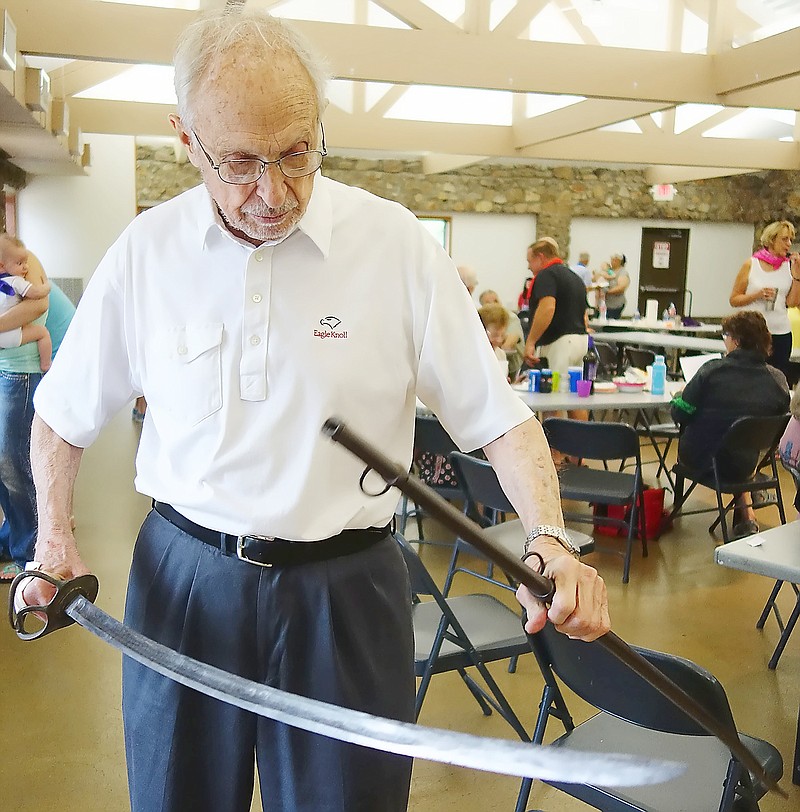Gen. Sterling Price's Missouri Expedition in the fall of 1864 has remained a point of historical interest for Edward "Ed" Lynn Bode, who has invested much time in researching a skirmish that occurred at the former Bode Ferry near Taos during this timeframe. In addition to accounts of the Civil War conflict that have been passed down orally through the years, Bode explained that a piece of Confederate history recovered decades ago near the Osage River recently returned for brief visit to Mid-Missouri.
"In early days of October 1864, (Confederate) General 'Jo' Shelby moved west toward Jefferson City to meet up with Gen. Sterling Price, who intended on capturing Jefferson City," Ed Bode said. "When they got to William Bode's ferry across from Taos on the Osage County side of the river, they captured William Bode and tied him up."
Joseph Shelby lived in Missouri for a large part of his life and was a veteran of the Battles of Wilson Creek and Pea Ridge. He later gained a level of notoriety for his command of the "Iron Brigade" - a cavalry brigade that was recognized for its toughness and resiliency in operations in the Trans-Mississippi Theater of the Civil War.
As Ed Bode went on to explain, a segment of Shelby's division made the crossing to the north side of the Osage River (the Cole County side) with plans to meet up with Price's troops and capture Jefferson City. During the crossing, Shelby's forces met with resistance from Union forces, who soon retreated up a hill once the Confederates made it across.
It was during this skirmishing, Bode said, that a vestige of the Civil War was deposited in a field, resting in the unknown spot until it was inadvertently recovered many years later.
"Several decades after the skirmish, the Bode owner on the Osage County side of the river found a sheathed sabre while in a field on the Cole County side north of the ferry landing," Ed Bode said. "Whether the saber was found above the ground or was buried is not known; however, considering the condition, it had most likely been buried and was possibly uncovered after the field was plowed."
The individual who discovered the artifact, Ed Bode noted, was a man named Bernard Bode - one of several children of William Bode, the owner of the ferry during the Civil War who was forced to transport Shelby's troops across the Osage River. Bernard Bode lived 1874-1952 and, though it is uncertain what year the saber was found, the item has continued to be passed down through his descendants.
"The saber has since been handed down to Gary Bode, a fourth-generation direct descendant of William Bode," Ed Bode said. "What's interesting, is that the saber is actually in very good condition and was found with a scabbard that appears to be made of leather." He added, "It has a curved blade that is approximately 3 feet in length and it weighs almost 10 pounds."
In an effort to verify the authenticity of the find, the current owner took it to a nationally recognized authority on Civil War sabers, who remarked that although it was made in Europe, he identified it as the type that would have been carried by a Confederate cavalryman.
In his book "The Collapse of Prices' Raid," author Mark A. Lause describes Shelby's troops as "hardened veterans of the partisan warfare that plagued the state, had led the advances on St. Louis and Jefferson City, but they remained, by temperament and experience, hard-riding cavalry raiders."
Ed Bode said oral histories passed down through the years by local elders, which note the skirmish between Union and Confederate forces at Bode Ferry, resulted in the death of four men - two Union and two Confederate soldiers.
"They don't have the names of those who were killed in the skirmish, but many years ago there were four indentions still visible in the ground where the bodies of those soldiers had been buried and were later exhumed."
In the book "An Osage County Civil War Patchwork," Roberta Schwinkle recites an article that appeared in the March 17, 1982, edition of the Unterrified Democrat, describing the recovery of other artifacts from the skirmish at Bode Ferry. As the article explained, a cannonball was uncovered on a farm in the area while a local resident was digging a foundation for a new outbuilding.
The owner of the saber now lives on the East Coast, and it will likely remain in the possession of the descendants of William Bode; however, it recently returned for a visit to Mid-Missouri so that members of the Bode family could witness firsthand a stunning item from the Civil War.
"We had a Bode reunion here in Jefferson City in June (2018) and Gary Bode brought the saber with him for everyone to see," Ed Bode said. "With his permission, I had the pleasure of removing the saber from its sheath and holding it in my hands."
He added: "It's very interesting that this piece has been in the Bode family all this time, and I don't think that there's any question that it came from the Battle of Bode Ferry. It's a fascinating remnant from the war that can still be seen and held, and in a way helps connect us to men like Jo Shelby and our local history."
Jeremy P. Amick writes on behalf of the Silver Star Families of America.

